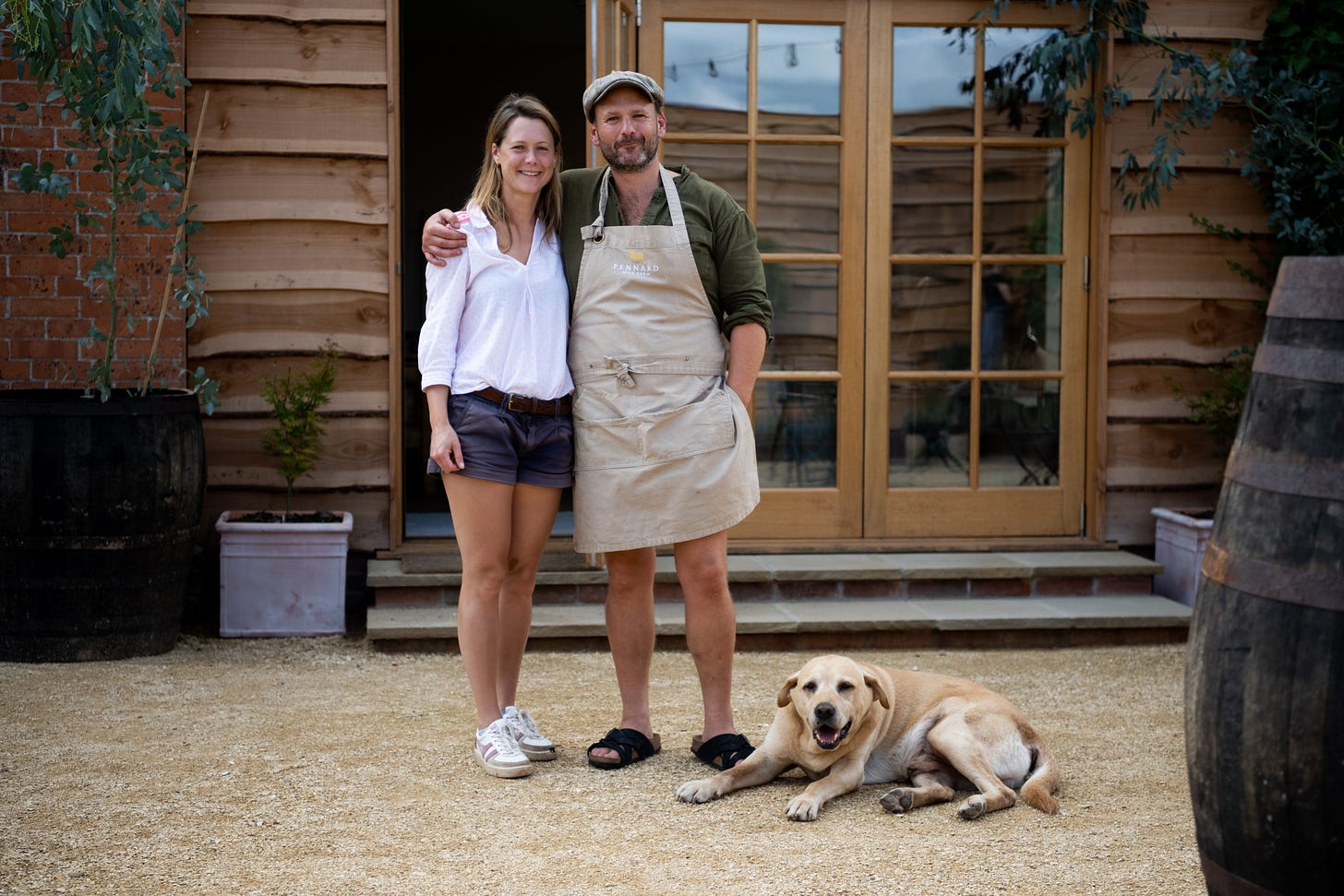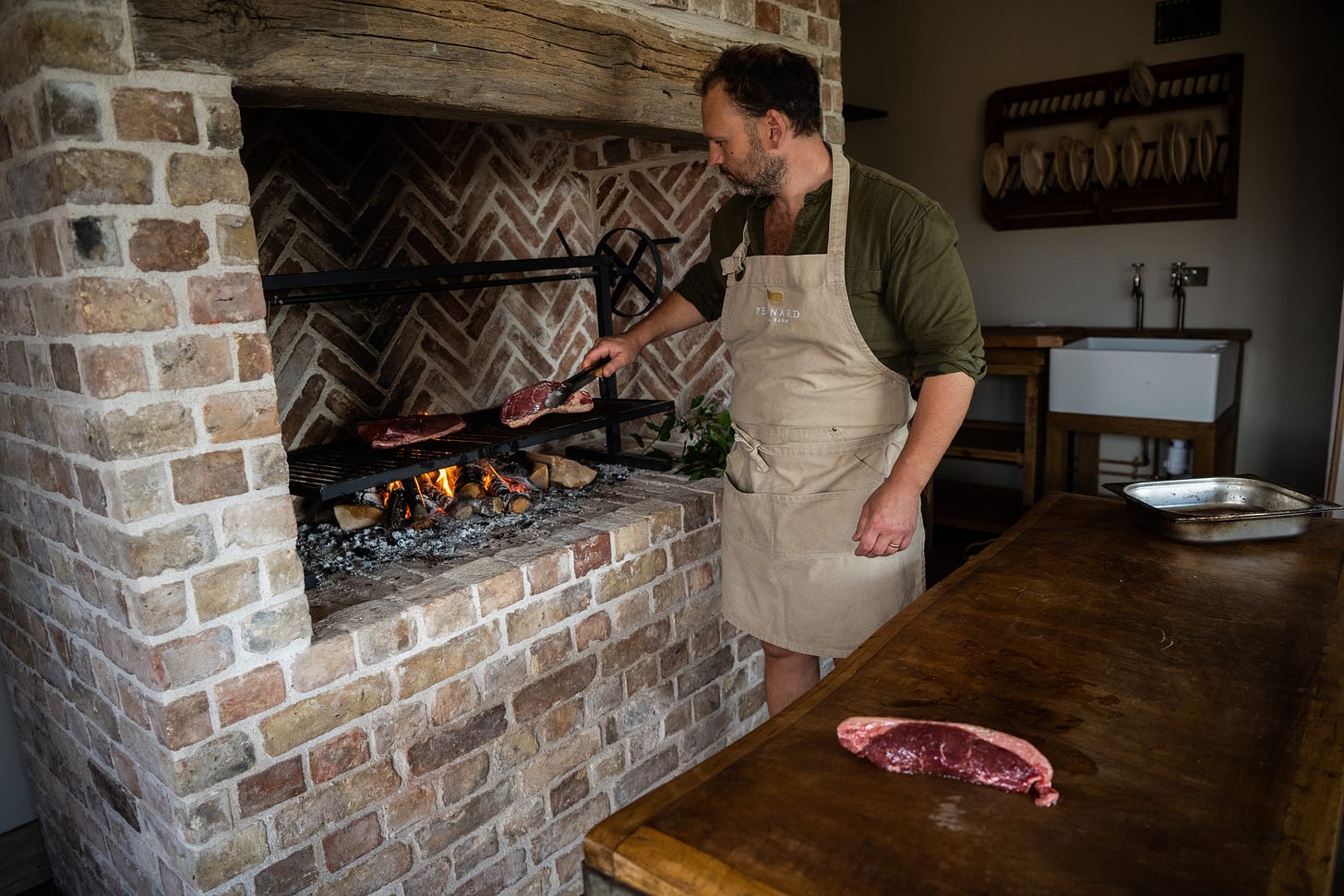To feast on a (Somerset) farm [WFJ #85]
The county's newest dining experience is all about championing local, regenerative, and wild food
Unlike much of the South West, true farm-to-table dining (where you can stay on a working farm and eat what is produced there, cooked to a high standard) hasn’t really percolated into Somerset’s culinary identity. Seemingly, there’s places like Nancarrow, Coombeshead, Crocadon, and River Cottage everywhere in the wider region. Everywhere but here.
Well, if Pennard Hill Farm – somewhat equidistant between Shepton, Glastonbury, and Castle Cary – is anything to go by, we might be rounding a corner. Though the farm itself has been in existence a fair while, those that have more recently started running the show – Pippa Godber-Ford Moore the host and her husband Tom the chef – are looking to turn the farm into a place-to-be for food and hospitality.
While the latter has more or less always been up for the taking at Pennard Hill with weddings, family get-togethers, and whatnot, the gastronomic element kicks off proper this month, once a month, with their ‘Feasting Nights’. This starts with a menu of items including rabbit croquette with fermented garlic, wild fennel focaccia, and roasted grouse with whortleberry and cobnuts.

As you probably gathered, the theme of the first night is distinctly ‘foraged’. Which is apt, given Tom’s background as a chef for shooting parties on Exmoor. “I've always tried to push the sustainability of wild food,” Tom tells the WFJ, and will do a lot of the shooting, foraging, and cooking himself.
It reminds me – as Fergus Henderson once said, “let nature write the menu”. Though wise and pithy, what he forgot to mention was, “don’t forget to deep-fry it too”. And so it is with Tom’s buttermilk partridge (no less moreish than, and a worthwhile substitute for, its counterpart Southern-fried chicken), making an appearance preceding pheasant and fennel salami, and, as I can vouch, probably the most delectable panna cotta anyone’s ever had.
After opening night, further iterations of Pennard Hill’s feasts become more producer-led: In November, pork from Gothelney Farm near Bridgwater provides the centrepiece. In December, it’s beef from organic beef farm Brown Cow, which happens to be Pennard Hill’s next door neighbour. This notion is yet to make its way into the minds of most local chefs and restaurateurs, but you don’t need to look much further outside the boundaries of Somerset, if that at all, for high tier produce.
“Coming from Exmoor, there's a couple of movers and shakers over there doing it a different way,” Tom says. “But there's plenty more around here. And they’re realising there’s a better way forward – that it doesn't have to be a total annihilation of food production with rewilding. There is a harmonious balance [between food production and nature] that can be forged.”
One of these movements tipping the scales is in regenerative agriculture, a term increasingly bounding around to describe farming that helps restore the soils, the countryside, and the species reliant on them. As well as Gothelney in particular, Tom makes another case in point that straddles the Somerset-Devon border and wears its regenerative credentials on its sleeve, and will no doubt have its place on a future Pennard Hill Farm menu. “One of the key ones is Amy over at Redwoods. She's just fantastic. We first came across her I think at The Frome Independent – she was so engaging, and has a lot of knowledge.”
As well as giving the kitchen something to think about, producers like Redwoods Farm are a source of inspiration for what goes on at the farm. Tom and Pippa keep their own pigs (Oxford Sandy and Blacks crossed with Mangalitzas – the latter a nod to what helped make Coombeshead such a success) and sheep (rare-breed Herdwicks), which appear on the menu whenever they’re available, whether via the curing room (Tom makes sure there’s an ongoing supply of charcuterie, which he makes on site), or the wood fire.
This is central to the operation, both in the menu and the feasting venue itself – not by accident, an open fire grill was built right in the middle of the 150 year-old converted haybarn in which guests come to eat. “It’s enormously important to me on an elemental scale,” says Tom. “Not only does it give the best maillard reaction and caramelisation and the element of smoke, but it's just a much nicer way to cook. If you are into nature, it’s good for the soul. It makes you enjoy your job more, and realise that cooking over an induction hob is a relatively miserable thing.”
Though it underlies the experience, dinner at Pennard Farm is something of an education, based on a perspective of how we might continue to enjoy food and what the countryside provides, without ultimately destroying it. In the same gesture, there is something uniquely comforting, and to borrow Tom’s word ‘soulful’, about being, and eating, on the land that has helped nourish you. Nancarrow, Coombeshead, Crocadon, and River Cottage all manage to pull it off. And early signs are showing Pennard Hill Farm could too.
“I certainly am no fountain of knowledge in its complete sense on regenerative farming,” says Tom. “But this is really about bringing it to people who want to enjoy themselves with like-minded others, learn something on the culinary front, something on the wild food and foraging front, something on the farming front, and hopefully make a difference on how they shop for, cook, eat, or think about food in the future.”





